|
7 Sandgate High Street
Sandgate
01303 248262
http://www.theroyalnorfolk.co.uk/
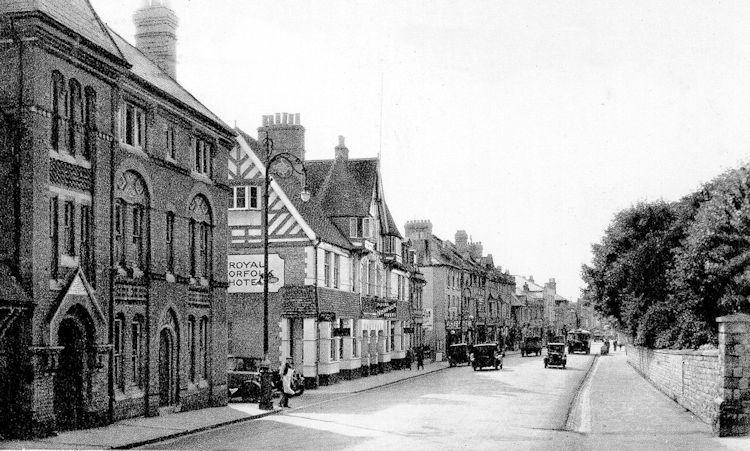
Above photo, date unknown. |
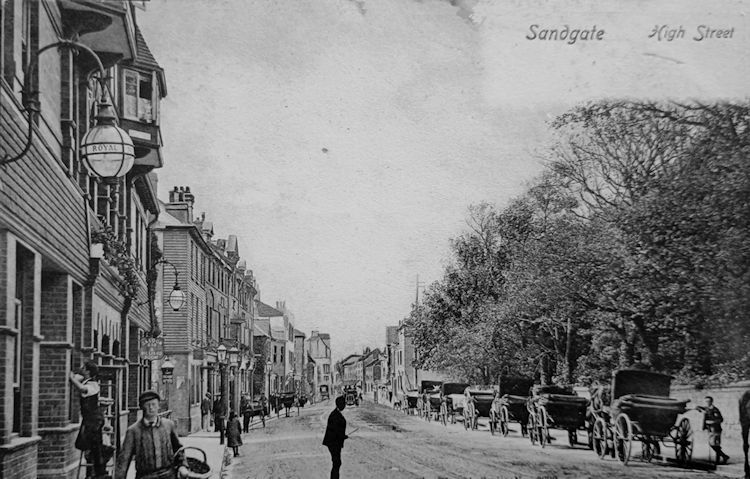
Above postcard, circa 1909, kindly sent by Rory Kehoe. |
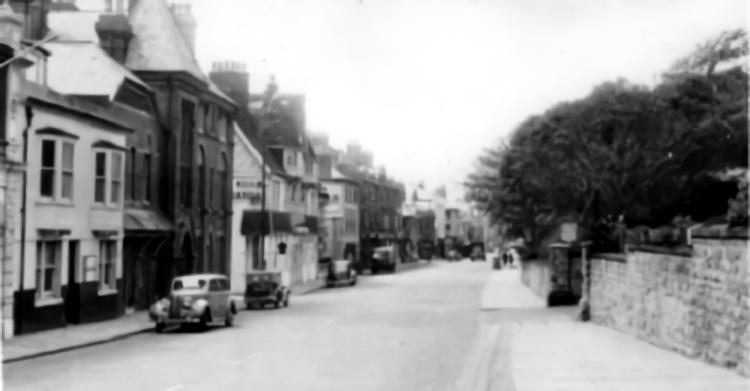
Above photo, circa 1947, kindly sent by Rory Kehoe. |
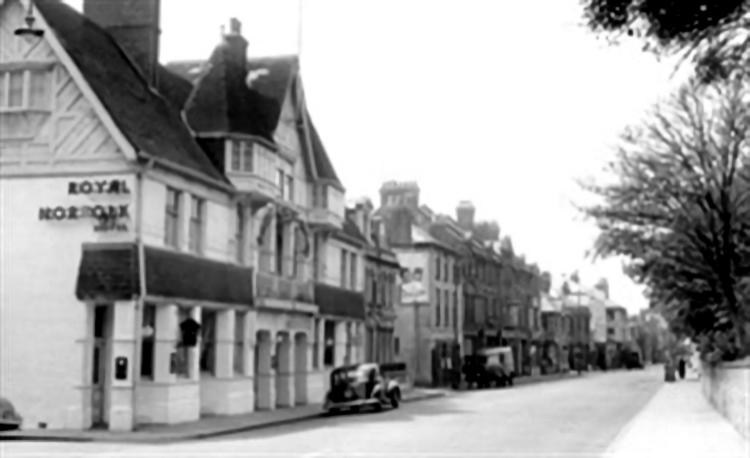
Above photo, circa 1947. |
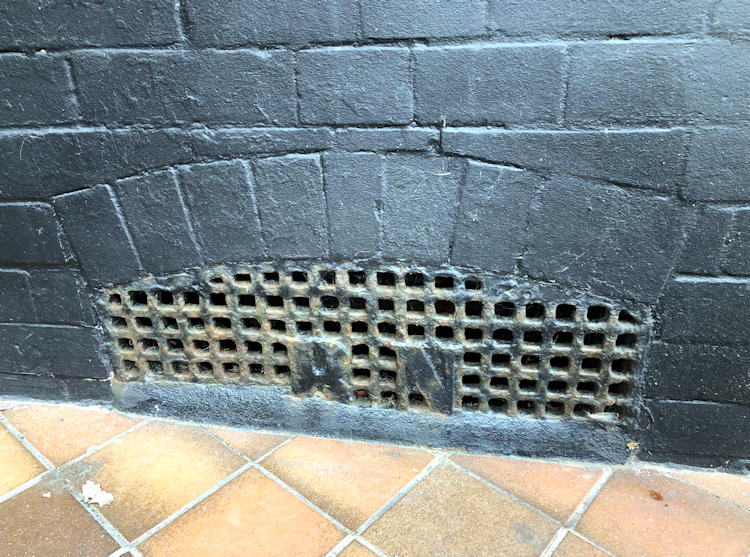
Above photo showing a grill of the "Royal Norfolk Hotel," 2020. |
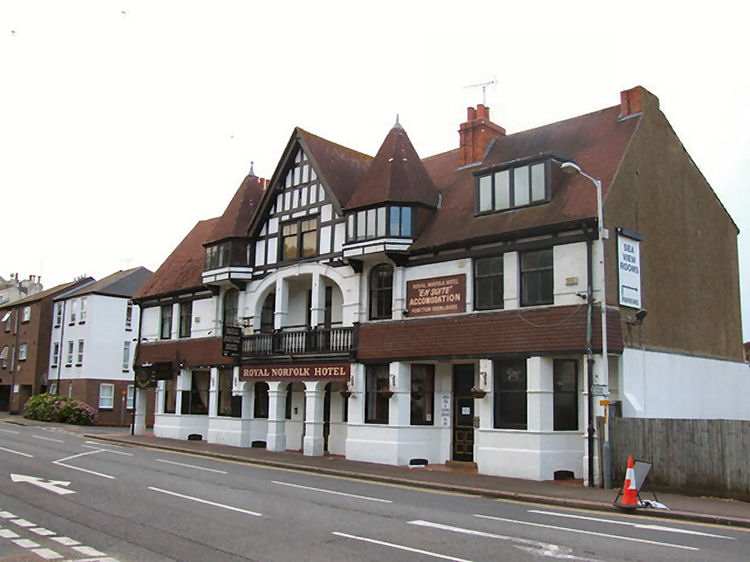
Above photo 2009 by Chris Whippet
Creative Commons Licence. |
Previously know as the "Ship
Hotel" and not to be confused with the "Ship Inn,"
which I believe was also operating at the same time.
In 1869-70 the pub was part of a consortium who were advertising their
goods of selling tea in response to grocers' selling beer and wine. (Click
for further details.)
Referred to as the "Norfolk" Broadway, Sandgate, in the Post Office Directory 1874.
|
From their web site, accessed 1st January 2016.
Records of the "Royal Norfolk Hotel" go back to the beginning of the
19th century when a weatherboarded Inn known as the "Ship" stood on the
site. In 1805 the landlord, Edward Hopper, was fined 5 shillings for
having four potts short of measure. Thankfully today you won't be served
any short measures in the hotel.
In 1825 there was a fight in the Hotel in which Thomas Page received
a fatal stab wound. John Burton was convicted of his manslaughter and
died himself soon afterwards. Before his death, however Thomas Page
confessed that it had been his own fault and that he forgave John
Burton. Following the unfortunate deaths the inn gained a reputation for
ghostly and strange happenings, and was even left empty for considerable
periods. It was only once the building was completely pulled down in
1901 and the Hotel rebuilt in the guise it stands today that the
paranormal events came to an end.
The "Royal Norfolk Hotel" took its current name after an extended
stay of the then Duchess of Norfolk and her young son in the late 19th
century. Arrangements for her stay were rather hurried after the
proprietor of the nearby "Royal Pavilion" hotel instructed the landlord
of the "Ship" to "clear out his guests to make room for the Duchess" as
his hotel was full. Understandably, the management were reluctant to get
rid of their regular customers, and it was only after some last minute
negotiation that the Duchess came to stay.
The Duchess of Norfolk is not the only grand person to have stayed:
the Prince of Teck visited in the 1890s and even Queen Victoria herself
reputedly stopped at the hotel.
Since October 2009, the "Royal Norfolk Hotel" has been run by the
mother and daughter team of Sandra Wilkins and Georgia Walker, who have
worked hard restoring the building to a now beautiful place to rest,
dine and relax. |
|
Whitstable Times and Herne Bay Herald, 7 April 1870.
SANDGATE. THE GOOD OLD COACHING DAYS.
The spirited proprietor of the "Royal Norfolk Hotel" is about to revive
a feature of the past by starting a four-horse fast coach to Canterbury.
The journeys are to be made on Tuesdays, Thursdays, and Saturdays and a
call will be made at the "Pavilion Hotel" Folkestone. The route taken
passes through a most delightful country, and a more enjoyable trip
could hardly be planned. We can imagine the sensation which will be
created in the villages of Denton and Barham as the smoking steeds pass
through. It is arranged to afford tourists four hours in Canterbury. We
expect to hear the coach is largely patronised.
|
|
From the Folkestone, Hythe, Sandgate and Cheriton Herald,
5 October, 1912.
ROYAL NORFOLK HOTEL, SANDGATE. Folkestone.
Pleasantly situated. Facing sea. Overlooking Countess Chichester's
beautiful estate and Ruins of Ancient Castle. Splendid Billiard Tab;e
and Smoking Lounge. Rebuilt and re-furnished throughout. Old English
Comfort and up-to-date luxury.
|
|
From the Folkestone Herald online, 19 September 2013. By
Joe Kasper
HOTEL AND PUB TRADE HIT BY ROAD CLOSURES
Resurfacing leads to complaints and loss of business
THE overnight closure of Sandgate High Street has caused a dramatic
drop in business, according to traders.
Since September 25, the High Street and Sandgate Esplanade between
Military Road and Prospect Road have been closed from 7pm until 2am on
weekdays for resurfacing.
The work is due to finish tomorrow Friday, but businesses in the area
say it cost them half a normal week's takings.
Affecting
Georgia Walker, manager of the "Royal Norfolk Hotel" in the High
Street said: “We had a band on last Friday, Boneyard, who we've had here
before. Normally as many as 50 to 100 people will come to the gig. But
this time it was half of that. I reckon we had about 20 come along. It's
been affecting us. It's been very slow and during the week it's dead. I
certainly feel like it's a lot quieter.”
KCC warned that pneumatic-hand tools, like a jackhammer, would be
used as well as audible warning reversing sirens, which cannot be turned
off due to health and safety requirements.
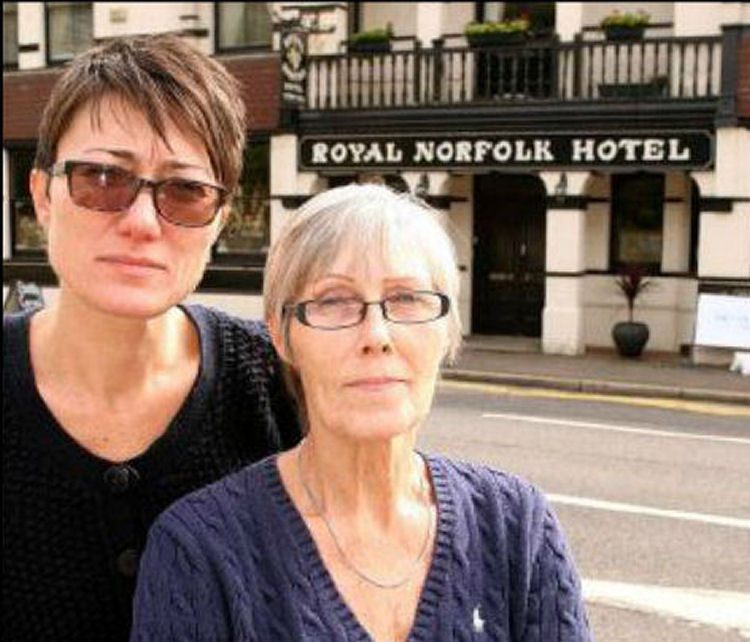
LOSS: Royal Norfolk Hotel manager Georgia Walker and her mum Sandra
Wilkins have noticed a drop in custom.
Hotel director and Sandgate resident Sandra Wilkins said: “Last
Friday night we had a really good band on and it was very quiet, I was
gobsmacked. I thought, what's happened? We couldn't believe it because
it's normally quite busy.
“One night I was really surprised how loud the road works were. I'm
used to a lot of noise as well. I hoped that it wasn't disturbing my
guests at the hotel. Luckily I haven't had any complaints.
“There's nothing I can do about it. We have been absolutely dead
during the week."
The "Ship Inn" has also feeling
the effects of the road closures.
A member of staff said: “We have had a number of cancellations and
complaints. The noise has caused customers to move to a different area.
We've had complaints about the noise. People have come down for a meal
and have been really unhappy.”
Disruption
Behdad Haratbar, head of programmed work at KCC, said: “We are
carrying out resurfacing work to further improve the standard of
Shepway's roads. To minimise disruption to drivers, businesses,
residents and other road-users, working hours have been restricted to
night-time.
“Advance warning signs were placed along the length of the road two
weeks before work started. Bus companies were advised and leaflets were
delivered to residents and premises. We have also liaised with local
businesses, placing signs to highlight they are open as usual.”
|
|
From an email received 1 March 2020.
The licensee of the Royal Norfolk Hotel from the late summer, or
autumn, of 1944 to the spring, summer or autumn of 1946 was Eric Herbert
(‘Bill’) Freeman (d.o.b. 3 February 1908). He was my father.
And then, from the time he left (in 1946) until some unknown date a few
years later, the licensee was Jack Bushell. He had been an accountant in
London, and was a friend of my father.
(1) When we moved from Banyers Hotel, Royston, to the Royal Norfolk
Hotel, Sandgate, Jack Bushell retired from accountancy and took over the
licence of Banyers. He lived there with his wife, May. It was his first
experience of being a licensee.
(2) The freehold of Banyers had been owned by a company, Banyers Hotels
Ltd. Jack Bushell bought that freehold, enabling the company to buy the
freehold of the Royal Norfolk Hotel, Sandgate. That is why the Royal
Norfolk was owned for a time by a company called Banyers Hotels Ltd. (It
was, in effect, a family company, although a private limited company.)
(3) Then, later, when we moved on from the Royal Norfolk to the "Bull
Hotel," Wrotham, Jack and May Bushell, following along behind, moved
from Banyers to the Royal Norfolk. I believe that Jack was, again, the
sole licensee. I do not know how long they were there for. I assume it
was until Jack retired completely.
I know that the years are correct, but this is how I have estimated the
months.
(A) In the summer of 1944, I was living at Banyers Hotel, Royston,
where my father was licensee. We must still have been there in early
June 1944, because, early one morning, I was taken out (a month after my
second birthday) to see Royston High Street (part of the A10, at the
time) crammed with what I now know to be military vehicles, driving very
slowly, nose to tail. That was all the more remarkable to my parents, as
the streets had been almost deserted up until then, owing to petrol
rationing. I now know that this was one phase of the back-up after
D-day.
D-day itself was on 6 June, but the vehicles that took part on that
actual day had already to be close to the Channel ports (Folkestone,
Dover, etc.) so that there would be no significant vehicle movements
visible from the air. Back-up on D+1, D+2, etc., came from successively
greater and greater distances, filling all the main roads, as detection
from the air was by then of no consequence. What I saw, in Royston, was
one phase of that.
So, when we moved to Sandgate, it must have been between July and
December 1944.
(B) Sandgate.
We must still have been at Sandgate in early 1946. I recall being
offered my first banana while we were there. How much is my own memory
(aged nearly four) and much is my mother’s later telling, I don’t know,
but apparently I associated it with children’s banana-flavoured
toothpaste, and would have nothing to do with it, and started crying.
The banana was then divided up among my parents and several staff,
customers, etc. (I can certainly remember banana-flavoured toothpaste,
and I don’t recommend it.)
There is a lot of inconsistency in the records concerning when bananas
became available after the war, but January 1946 would seem the most
likely.
Wrotham.
We must have moved to the "Bull
Hotel" in Wrotham by late 1946, because I can remember being there
during the snows of the terrible winter of 1946/47. That winter was
terrible enough for it to have several web pages now devoted to it. The
exceptionally cold weather began in December 1946, and the even more
exceptional snow began falling in January 1947 The cold and snow lasted
until March, when there was an equally sudden and catastrophic thaw.
I can remember crossing Bull Lane, outside the hotel, along a path cut
through the drifts which were higher than I was (aged four and a half)
on either side, and I can remember men with spades doing the cutting.
Bull Lane was impassable to traffic.
We had already been at the Bull for at least some time (that is, a
month, or a few months) when the snow had begun to fall, and my memories
are of people’s surprise when it had only just (so suddenly and so very
deeply) fallen.
So, when we moved from Sandgate, that must have been between February
and November 1946.
Bill Freeman.
|
LICENSEE LIST
 WARD George 1868-74+ (age 42 in 1871
WARD George 1868-74+ (age 42 in 1871 ) )

HULL John 1881-82+ (age 50 in 1881 ) )
BROOK William 1891+ (hotel keeper age 47 in 1891 ) )
AKERMAN George 1891+ (age 44 in 1891 ) )
HIGGINS Stephen 1891+ (hotel proprietor age 37 in 1891 ) )
KEELER George P 1899-1918+
  (forage, contractor & fly proprietor
(forage, contractor & fly proprietor
 ) )
HULBERT Miss Ada Pauline 1934 (proprietoress ) )
FREEMAN Eric Herbert "Bill" 1944-46

BUSHELL Jack 1946+
PAYNE Douglas & Molly 1951-66
PAYNE Dolly 1966-70
WALKER Georgia & WILKINS Sandra Oct/2009+
https://pubwiki.co.uk/RoyalNorfolk.shtml
 From the Post Office Directory 1874 From the Post Office Directory 1874
 From
the Kelly's Directory 1899 From
the Kelly's Directory 1899
 From the Post Office Directory 1918 From the Post Office Directory 1918
 From
the Kelly's Directory 1934 From
the Kelly's Directory 1934
 Census Census
|






